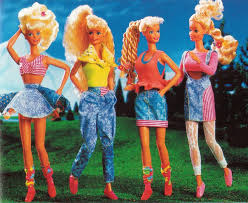THE GIRL IN THE MIRROR
January 8, 2024 | Author Friend Promo
from Anne Montgomery
 A preoccupation with beauty, fueled by 24/7 internet postings, has many young women obsessed with their looks.
A preoccupation with beauty, fueled by 24/7 internet postings, has many young women obsessed with their looks.
I’ve been working out in some form or another all my life. Though I used to be more of a gym rat, today I primarily swim laps, a habit that leaves me with goggle-eye indentations, smudged make-up, and wet hair spiking in all directions. Often, due to the insanely short life span of some of my Speedos, my suits tend to lack the elasticity required to hold my 68-year-old physique in place. I know what you’re thinking. Not a pretty picture.
But for the brief, big hair, sparkly spandex, workout era of the 80s, the health club has mostly been a place where pretty wasn’t important. Perhaps that’s why she had me so nonplussed.
The attractive young woman, probably in her early twenties, stared into her phone. Tight black shorts and a crop top encased her frame. She pursed her lips and lifted her chin. Then, looking over her shoulder at the mirror behind her, she snapped a series of selfies, shots aimed to highlight her, um, posterior.
I tried not to stare, but as I dried off after my shower and dressed, I couldn’t help but sneak a peek, now and then. The camera clicked away. She turned her hips a fraction of an inch and the snapping resumed.

Barbie’s perfect proportions created a generation of women with body-image issues.
I grew up in the world of Barbie, a perfectly proportioned piece of plastic that, no doubt, led to a generation of women with body-image issues. And while there were also magazine and TV beauties to contend with, our experience was relatively benign compared to the image assault young women must deal with today: a 24-hour stream of internet images highlighting impossibly beautiful, often photoshopped, people. Sadly, approximately 91% of women in the U.S. are unhappy with their bodies.
I’m a high school teacher and I worry about the pressure that’s being placed on our young people. Those unhappy with their looks can suffer from low self-esteem, which can lead to eating disorders, early sexual activity, substance use, and suicidal thoughts.
I was approached by one of my journalism students recently. She was writing a story about body-image issues. “Ms. Montgomery, when do women finally become happy with their bodies?”
“Never,” I said, without thinking. Her face fell. “I mean, when you get older, other things become more important.” I scrambled to put a positive spin on my answer but could see the damage was already done.
A week after I first saw her, the girl at the health club reappeared. This time, she faced a different mirror and, after lifting the edge of her shirt to reveal solid abs, she began taking pictures again. After myriad photos, she slumped onto a bench and scrolled through the images, all the while frowning into her phone.
As I gathered my things to leave, she walked in front of another large mirror and paused, staring at the floor, wanting, perhaps, to just pass it by. But something compelled her to stop and lean in close, turning her face one way then the other, as she batted long false eyelashes and tossed her hair.
Pretty can certainly be nice. In fact, studies have shown that, fair or not, attractive people are more likely to get hired, receive promotions, and have larger paychecks than those who might be lacking in the pulchritude department. However, as those pretty folks will eventually learn, physical beauty does not last.
“Ms. Montgomery, when do women finally become happy with their bodies?”
“It all depends,” I should have said to my student reporter. “Perhaps, when we focus on all the fabulous opportunities life throws at us, face our aspirations head on, and surround ourselves with people who love us and make us laugh, maybe then we stop worrying about things that are really not important.”
As I watched the girl wrench away from the mirror, I hoped she might have goals to dream about, hobbies she enjoyed, and people in her life who would love and cherish her, even on those bad-hair days. I wanted to tell her, but I did not. I think there are some things we just need to learn on our own.
Please allow me to offer you a glimpse at my latest women’s fiction novel for you reading pleasure.
 The past and present collide when a tenacious reporter seeks information on an eleventh century magician…and uncovers more than she bargained for.
The past and present collide when a tenacious reporter seeks information on an eleventh century magician…and uncovers more than she bargained for.
In 1939, archaeologists uncovered a tomb at the Northern Arizona site called Ridge Ruin. The man, bedecked in fine turquoise jewelry and intricate beadwork, was surrounded by wooden swords with handles carved into animal hooves and human hands. The Hopi workers stepped back from the grave, knowing what the Moochiwimi sticks meant. This man, buried nine-hundred years earlier, was a magician.
Former television journalist Kate Butler hangs on to her investigative reporting career by writing freelance magazine articles. Her research on The Magician shows he bore some European facial characteristics and physical qualities that made him different from the people who buried him. Her quest to discover The Magician’s origin carries her back to a time when the high desert world was shattered by the birth of a volcano and into the present-day dangers of archaeological looting where black market sales of antiquities can lead to murder.
AMAZON BUY LINK
Anne Montgomery has worked as a television sportscaster, newspaper and magazine writer, teacher, amateur baseball umpire, and high school football referee. She worked at WRBL‐TV in Columbus, Georgia, WROC‐TV in Rochester, New York, KTSP‐TV in Phoenix, Arizona, ESPN in Bristol, Connecticut, where she anchored the Emmy and ACE award‐winning SportsCenter, and ASPN-TV as the studio host for the NBA’s Phoenix Suns. Montgomery has been a freelance and staff writer for six publications, writing sports, features, movie reviews, and archeological pieces.
When she can, Anne indulges in her passions: rock collecting, scuba diving, football refereeing, and playing her guitar.
Learn more about Anne Montgomery on her website and Wikipedia. Stay connected on Facebook, Linkedin, and Twitter.





